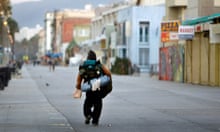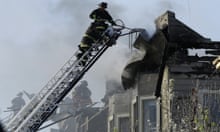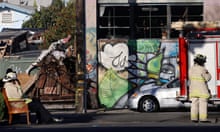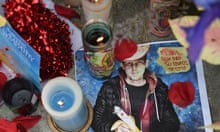A devastating warehouse fire that killed at least 36 people has shone a harsh light on a housing crisis in Oakland and its consequences for artists and low-income residents.
The fire, which broke out during a party at the ‘Ghost Ship’ warehouse on Friday night, sent shockwaves through the underground arts and music scene in the northern California city where rapidly rising rents have forced people to live and make art in shared and sometimes hazardous spaces.
Some reports have cast blame on the artists and residents associated with the warehouse where so many people died, trapped in a building that lacked basic fire safety mechanisms.
Long-time Oaklanders and tenants’ rights activists, however, said the tragedy was a symptom of a major affordability crisis and the long-term failure of urban housing policy to protect the most vulnerable people.
Grieving artists – many still waiting for official news about friends who went missing in the fire – said on Sunday the city must find a way to ensure that underground performance spaces, “live-work” warehouses and overcrowded homes were safe, without shutting down venues and evicting tenants.
“The scope of the loss is terrifying,” said Sarah Carlberg, assistant director of a local book festival. She was priced out of Oakland last year and had friends who were at the Ghost Ship party.
“Each one of these people were only at that venue by virtue of the fact that they were very engaged artists – the people who make Oakland what it is.”
‘Vital to the fabric of Oakland’
Oakland sits across the bay from San Francisco, the most expensive city in the US. Experimental musicians and independent artists have long made use of its unconventional venues and cooperative living spaces.
“Warehouse parties have been a central part of Oakland for decades,” said Nihar Bhatt, a DJ and record label owner who survived the Ghost Ship fire.
The city’s underground spaces, which may lack traditional permits or business licenses, are particularly vital for LGBT artists and people of color often excluded from the mainstream industry, dominated by white men, he added.
“There’s a movement in Oakland of experimental black and brown and queer people who don’t necessarily want to be in a bar or a club,” Bhatt said.
Russell Butler, a musician who was outside the venue and witnessed the fire, said in an email interview that underground venues were “vital to the fabric of Oakland”, not only because of the opportunities they provided for under-represented artists, but also because many functioned as welcoming spaces for marginalized people who felt unsafe in licensed clubs “where they may be harassed or assaulted for just trying to live their lives”.
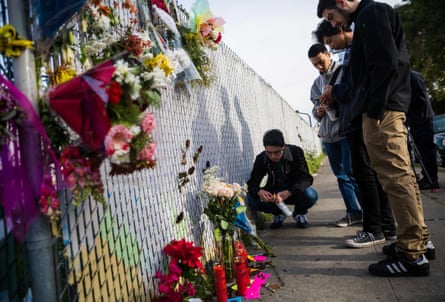
Sometimes the buildings have not been inspected and are not up to code. The consequences can be fatal. In 2015, a fire killed two artists in an Oakland live-work building and displaced two well-known publishing organizations.
But when residents raise concerns about dangerous conditions, the results can be devastating in other ways. Earlier this year, dozens of renters lost their homes in an Oakland warehouse space after the city deemed it unsafe for habitation.
When the city determines a living situation is hazardous – which can often happen when an industrial warehouse is not permitted or built for residential living – it can create a pathway for real-estate developers to remove a low-income arts community and replace it with more profitable, market-rate housing.
“That’s a slumlord landlord’s best-case scenario,” said Tarik Kazaleh, a long-time Oakland musician who feared the Ghost Ship tragedy could lead the city to close other spaces. “They’ll just get a tech firm and get more money.”
A life or death choice
Fires and city shutdowns are not the only threat to the underground art scene. Many artists simply cannot afford to live here any more.
Oakland has some of the fastest-rising rents in the US, and activists have been increasingly concerned about gentrification and displacement caused by the technology boom in nearby San Francisco and Silicon Valley.
The spaces that make up Oakland’s thriving DIY arts scene have been vanishing, as artists have moved away.
“The best spaces have been wiped out,” said Jonah Strauss, a recording engineer who was displaced in the 2015 fire that killed two people. “Lack of affordable living spaces is the single greatest threat to Oakland arts and music.”
Some people refuse to leave, said María Poblet, executive director of Causa Justa, a housing rights group. She said she was upset by the way some people were “blaming the victims” of the fire.
“We shouldn’t have to choose between affordable housing and safe housing,” she said. “It’s really insufficient to look at the situation and not look at the structural problems that we have.
“If you can’t afford to buy a million-dollar home, then you can’t afford to live in this city unless you’re willing to risk your safety. And that’s unconscionable.”
Housing activists in Oakland have long fought for better protections for renters and for the construction of new housing for very low-income people. Artists have argued that there are ways the city and underground communities can make venues safe without mass displacement.
Strauss said the city should move away from a punitive system in which officials “red tag” buildings and kick out tenants, and instead help underground spaces become safe for existing residents. “We need a new pathway to legitimacy,” he said.
In the current system, artists and low-income tenants working and living in dangerous conditions often have an impossible choice. Asking a landlord or city official for help can result in homelessness.
“The city comes in and penalizes people,” said Carlberg. “It doesn’t accomplish anything. It just puts people in another cycle of poverty.”
Kazaleh said artists needed to rely on each other to ensure their spaces were safe: “There’s no easy answer. We have to be completely self-policing now. We don’t want city inspectors snooping around.”
‘Music saves people’
In the wake of the latest tragedy, artists and community groups were gathering and looking for ways to assist each other, said Lisa Aurora, co-founder of Naming Gallery in Oakland.
Some were organizing to provide fire extinguishers for venues that may need them, she said, adding: “We come back and continue to do what we’re doing and support each other.”
Some artists said creative expression and community parties were a form of survival and coping.
“It’s already essential to so many people but we’re forced to feel like criminals,” said Bhatt, adding that there should be more publicly funded art spaces.
Butler said: “This music is more than someone’s good time. It’s more than another night out. It is healing, it saves people. It saved me and many others.”

